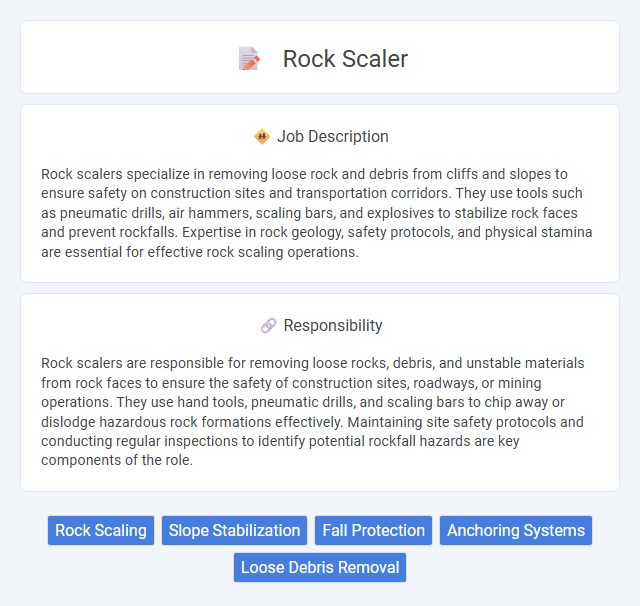
Rock scalers specialize in removing loose rock and debris from cliffs and slopes to ensure safety on construction sites and transportation corridors. They use tools such as pneumatic drills, air hammers, scaling bars, and explosives to stabilize rock faces and prevent rockfalls. Expertise in rock geology, safety protocols, and physical stamina are essential for effective rock scaling operations.
Individuals with strong physical endurance and good upper body strength are likely to be suitable for a rock scaler job due to the demanding manual labor and often challenging outdoor conditions. People who have a fear of heights or limited mobility may find this role less appropriate because it frequently involves working on steep, rocky terrains. The probability of success in this job increases for those who possess excellent safety awareness and the ability to remain focused in potentially hazardous environments.
Qualification
A rock scaler must possess comprehensive knowledge of geological formations and rock mechanics to perform effective hazard removal on steep slopes and excavation sites. Certification in safety protocols such as OSHA and proficiency with scaling tools including hammers, air chisels, and brush cutters are essential qualifications. Experience in mountaineering or industrial climbing enhances a scaler's ability to navigate challenging terrains safely.
Responsibility
Rock scalers are responsible for removing loose rocks, debris, and unstable materials from rock faces to ensure the safety of construction sites, roadways, or mining operations. They use hand tools, pneumatic drills, and scaling bars to chip away or dislodge hazardous rock formations effectively. Maintaining site safety protocols and conducting regular inspections to identify potential rockfall hazards are key components of the role.
Benefit
A rock scaler job likely offers significant safety benefits by reducing the risk of rockfall accidents in mining and construction sites. This role probably enhances site stability, which can minimize downtime and increase operational efficiency. Workers may experience improved job security due to the critical nature of maintaining safe work environments.
Challenge
The rock scaler job likely involves significant physical and environmental challenges, requiring workers to navigate unstable, steep terrain to remove loose rock or debris. Safety risks such as falling rocks and difficult weather conditions probably demand constant vigilance and adherence to stringent safety protocols. Success in this role may depend on a combination of physical endurance, technical skill, and the ability to assess and mitigate hazards effectively.
Career Advancement
Rock scaler jobs offer essential experience in mining and construction industries, providing a foundation for advanced roles such as drill operator or mine supervisor. Mastery of safety protocols and rock removal techniques enhances employability and opens pathways to specialized positions like geological technician or safety inspector. Continuous skill development and certification in heavy equipment operation significantly boost career growth opportunities in this field.
Key Terms
Rock Scaling
Rock scaling involves the systematic removal of loose rock from cliffs or quarry faces to prevent rockfall hazards and ensure site safety. This high-risk job requires specialized tools such as pneumatic hammers, rock drills, and scaling bars, alongside safety equipment like harnesses and helmets to protect workers. Skilled rock scalers play a critical role in construction, mining, and infrastructure projects by maintaining stable rock surfaces and preventing potential accidents.
Slope Stabilization
Rock scaler specialists play a critical role in slope stabilization projects by removing loose rocks and debris from unstable slopes to prevent landslides and rockfalls. They utilize handheld scaling bars, pneumatic tools, and other specialized equipment to ensure the safety of construction sites and roadways. Effective rock scaling improves slope integrity, reduces erosion, and protects both infrastructure and personnel in hazardous terrain.
Fall Protection
Rock scalers play a crucial role in removing loose rock from cliffs and slopes to ensure safety in construction and mining sites. Effective fall protection for rock scalers includes using full-body harnesses, secure anchor points, and reliable rope access systems to prevent accidents during high-elevation work. Constant inspection of fall arrest equipment and adherence to Occupational Safety and Health Administration (OSHA) standards significantly reduce the risk of falls in hazardous environments.
Anchoring Systems
Rock scalers specialize in stabilizing rock faces using advanced anchoring systems that enhance safety and prevent rockfalls. These systems commonly involve the installation of rock bolts, cables, and mesh, designed to secure loose rock and ensure structural integrity on slopes and cliffs. Effective use of anchoring technology reduces environmental impact and improves long-term slope stabilization in construction and mining operations.
Loose Debris Removal
Rock scalers specialize in removing loose debris from rock faces to prevent hazardous rockfalls and ensure the safety of construction sites, roads, and tunnels. Using hand tools or pneumatic equipment, they chip away unstable rocks and clear loose material to stabilize slopes and cliffs. Their work is essential in maintaining safe environments in mining, highway construction, and geological hazard mitigation projects.
 kuljobs.com
kuljobs.com